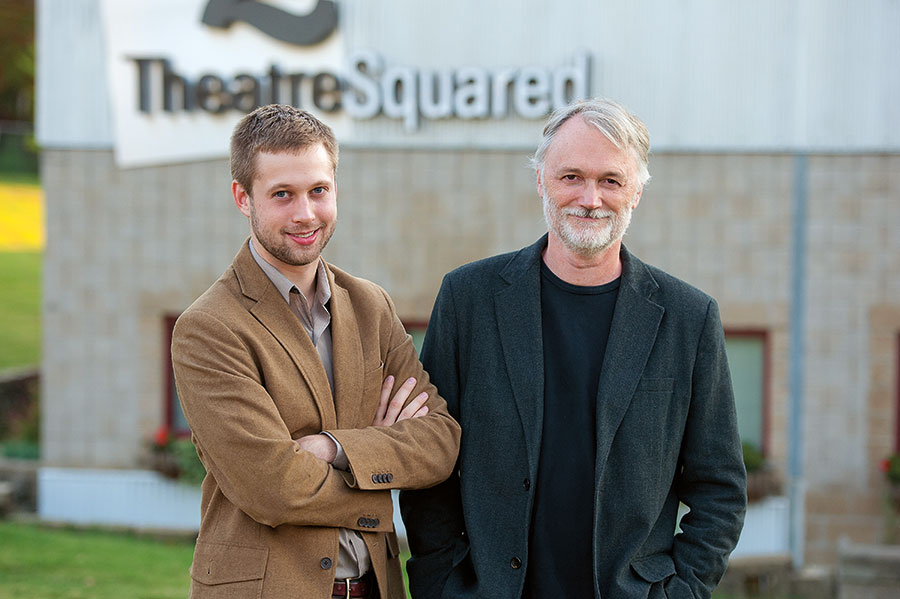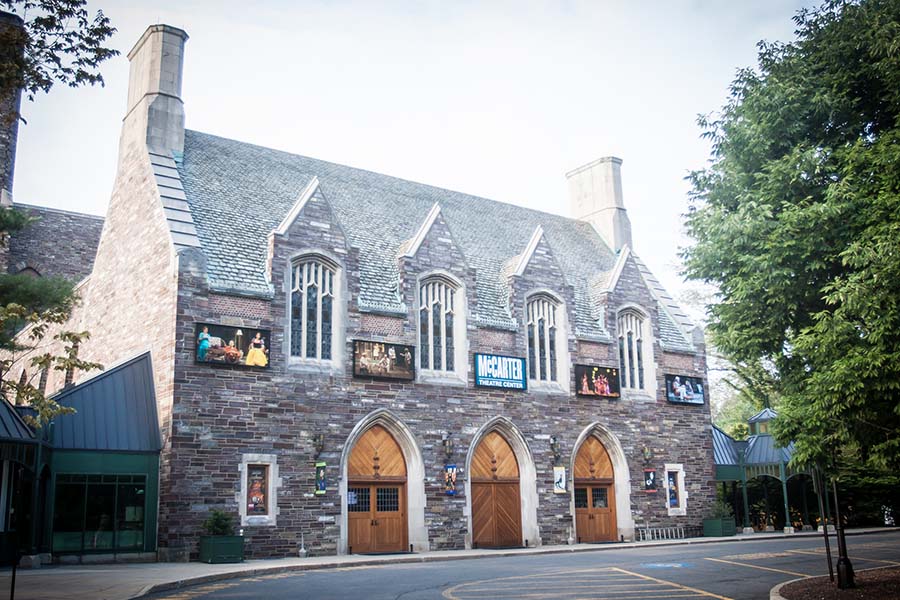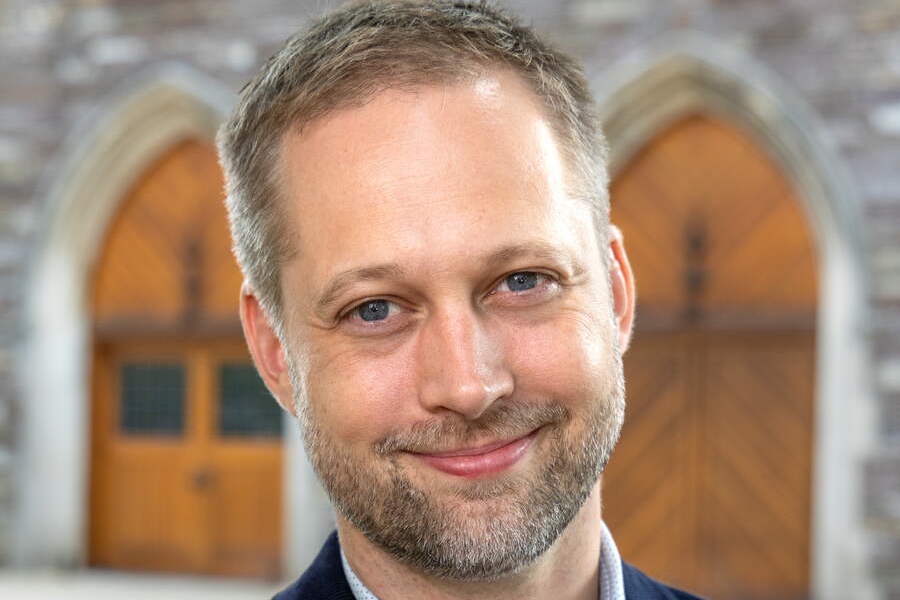I first met Martin Miller at the TCG Conference in Chicago in 2010, when he had only recently started his job as executive director at TheatreSquared in Fayetteville, Ark. In the years since, we’ve watched in these pages as that small theatre in a college town has grown prodigiously in size and impact, embarked on an ambitious new building, even risen to national prominence, in part due to its innovative digital programming during the pandemic shutdown.
The splashiest moment came when, in fall 2021, they mounted and broadcast a live stage adaptation of the popular 1980s sitcom Designing Women, written by show creator Linda Bloodworth-Thomason, and got national press about it. The most button-bursting moment may have come when their fall 2020 virtual co-production with TheatreWorks Hartford and The Civilians of Sarah Gancher’s Russian Troll Farm won an Obie Award—an unprecedented feat for an Arkansas theatre, it’s safe to say.
Now, after 14 years in the post, Miller has accepted the job of executive director of Princeton, N.J.’s McCarter Theatre Center, a historic institution with roughly twice the budget of TheatreSquared, where starting this month he is serving alongside artistic director Sarah Rasmussen. As he revealed in a July interview, Miller has both professional and personal reasons for the move.
ROB WEINERT-KENDT: First of all, congratulations. Are you still in Arkansas right now?
MARTIN MILLER: I am. I’m talking to you from Fayetteville. I formally begin at the McCarter in September.
Before I talk about your career, I want to ask a version of what I’ve been asking all theatre leaders I speak to these days: How’s business?
We just wrapped up our new-play festival, and right now the building is full of kids for summer camps. We have a free camp for kids across Arkansas that we get a little state support for. As for the season itself, this was a really hard year to predict for a lot of companies. For TheatreSquared it was specially hard, because we’d never had a full season in our new home. We opened the doors in 2019 and got to March 2020, and then—it’s an old story at this point. So we didn’t really have a template in terms of how to set expectations for audiences. Interestingly, this season we hit the highest earned income number we’ve ever hit as a company; it was also below what we budgeted, because we just didn’t know where to peg it. It was a year that felt at the time like a bit of a tightrope walk. But we feel really good about it, and a big piece of that is the goodwill the company has in the community. Also the quality of the work on the stage, and what’s been a really sustained and widespread act of generosity from the region. It’s stunning to look at: From 2019 to 2022, giving to the annual fund at TheatreSquared grew by 70 percent. It’s interesting, because it feels like, for a lot of people, the experience of the last few years reminded them of why theatre was so important in their lives. But a key piece of that was the theatre’s continued presence in their lives during the pandemic shutdown—we were doing a lot of original programming and got a lot of recognition, and we kept our team intact. I think that made a big difference in terms of whether many people not only got out of the habit of attending, because obviously somewhat they did, but also out of the habit of support. People not only continued to give to TheatreSquared, they gave more, and now that habit is renewed and strengthened. For TheatreSquared, those have been a couple pillars that they’ve been able and need to lean on coming into this year and going into next year.
Still, there are some strong headwinds out there. Things feel unpredictable. The regional funding landscape is shifting. Local government in northwest Arkansas is this wonderful group of people who have great social ideals, but nevertheless have no practice of supporting and sustaining arts institutions, so we have not been able to get public support on any continuing or ongoing basis from the city of Fayetteville. I think that’s an opportunity for whoever’s coming next.
You grew up in Fayetteville, is that right? Were the arts a big part of your upbringing?
When I was a kid in this area, the arts were present, but not in any semblance of the cultural landscape that we have now. There was one presenting institution that brought through the tours, there were community theatres, and there were education-focused organizations. But the muscle of producing professional theatre—you would have to either get on a plane or travel hundreds of miles in any direction to go and see it. For a long time, Arkansas really had only one year-round producing theatre, which was Arkansas Repertory Theatre in Little Rock. When I arrived at TheatreSquared in 2009, they had just started the company a few years before, and the previous year’s annual income was around $160,000. The most recent three-week production that had wrapped had just over 300 people attend, of which not a small proportion were comps. It was the Great Recession, and my personal checking account was roughly equivalent to the theatre’s checking account at that moment—four digits. It was definitely a very scrappy moment for the company. But what compelled me is, I saw a wonderful production of a play when I came down to interview—just the quality of the acting, the direction, the emotional truth, was just spot on. Looking around and seeing there were only, like, 30 other people in the room, made me think, all right, the hardest thing is already being done here, which is creating great theatre; building an audience and support can happen around that. If the art needed to be fixed or reinvented, this would be an impossible situation, but if the art is good, you can always build around it. That was my feeling at the time, and it remained my feeling, and is still central to how I think about the health of institutions.

So we got to work and grew to, this year, a $7.5 million operating budget, and a pretty stellar full-time and part-time team, ranging from 90 to 100, depending on what time of year you’re looking at it. And with all the wonderful national accolades and recognition we’ve had—when I started, I used to have to stand outside the building and tell people where TheatreSquared was and what it was, even while literally standing right in front of it. Recently I was standing in line at the TKTS booth in New York City and one of the people handing out flyers saw my T-shirt and said, “TheatreSquared? I love that place.”
So why leave now, and what drew you to the McCarter job?
The McCarter is a really trailblazing, historic theatre—those two words don’t always go together—and a significant presence in the American theatre. So I would have been thrilled to even consider that opportunity, no matter what my life circumstances were. But I certainly paid even closer attention to it because in 2019, my wife accepted a position on the music faculty at Princeton. So believe it or not, since 2019, I have been burning up the corridor between LaGuardia and Fayetteville to continue to co-lead TheatreSquared while living with my family in Princeton. What that has added is a bit more of an understanding and affection for Princeton as a place, for the people that are there, for the university as an institution. There are so many places—Arkansas and New Jersey are two—that conjure up these somewhat static thoughts in people’s minds, but it’s only when you actually live in a place and really form relationships with the people there that you come to understand them fully, and, I would say, have the ability to really love them. Because you go from this sense of, “Oh, Arkansas, I know what that is,” or, “Oh, New Jersey, there are three jokes about that in Hamilton.” People think they know exactly what Princeton is, and, well, most people are wrong. So it absolutely made me all the more excited to go into those conversations.
Also, I’m just gonna say, where I feel my experience at TheatreSquared is so relevant to the aspirations not only of the McCarter but also the Princeton community at this moment, is that there is such a desire in the American theatre writ large—and definitely at the McCarter, in Sarah Rasmussen’s vision for the place—to have theatres be community gathering spaces. Princeton is a place, I have learned, where people really are looking for that third space, the sort of place where you get a sense of community that’s not work or home, a place where everybody feels welcome, and somewhere that’s got a little funkiness to it—something organic and human and approachable, while elevated and exciting. Those are principles that guided our design for the new home of TheatreSquared and the work that we do, and it all mixes in so well with this desire for creating a more equitable community. Because when you do create a space that really feels democratic, that really feels accessible, it automatically has this community-building effect, where people sit next to people they wouldn’t otherwise sit next to, and then start to break down their assumptions about what’s for them versus for someone else. The experience of creating the commons at TheatreSquared—from an architectural standpoint, with an amazing bar/café, but also enlivening it with all of these community programs, like a Black-owned business expo or a poetry night, that keep that space active throughout the year—feels incredibly relevant to what the Princeton community is looking for, and what I think will help carry the McCarter into its next phase.

You just mentioned a few examples at TheatreSquared. What are some examples of that kind of programming at the McCarter?
Oddly, my transition to the McCarter versus my transition to TheaterSquared couldn’t be more different, yet it’s oddly similar in one core way: The work being done at the McCarter is guided by people who really understand artistic excellence. It’s still in a moment of transition there. The organization was brilliantly led by Emily Mann for three decades, and Sarah Rasmussen hasn’t really had the chance to make an introduction. Even this last season, I think everyone feels, was still sort of a prelude to a more full-fledged reengagement in the work. And I’m seeing that the people involved in those conversations really know what they’re doing: Paula Abreu, who brings in the special events, and Nicole Watson, the associate artistic director, whose production of Blues for an Alabama Sky I just saw, which was absolutely thoughtful and genuine and compelling. Once again, it’s a conversation around, how do we build community? How do we build support? How do we bring in attendance and make this space feel vibrant and loved in the community? What it is right now is, people are proud that it’s there. People say, “Look at this amazing Tony-winning institution with this nearly 100-year legacy, where Our Town premiered—how many communities are lucky enough to have that?” What I hope we can regain over the next years is for the first sentence not to be “how cool” or “I’m proud” but rather, “I love that place.” That is what wants to be rekindled after this pandemic pause for the McCarter, and I think that with the right kind of opening of the gates there, that will happen.
One huge opportunity is Princeton itself, another institution with an amazing legacy brand and impact that has also been going through this wonderful sense of opening the gates in the last 15 to 20 years. And yet the two institutions are still figuring out how they can align that purpose. In the conversations I’m having with folks that are on the leadership team at the university, as well as friends who are faculty and staff, there’s a desire to link those visions and do more. So now it’s a question of not whether, but how quickly can we get to it? That partnership is really primed to expand in a more meaningful way. I can’t wait to fuse that amazing energy, ideas, resources, and people with what the McCarter wants to become for this next big chapter.
We’ve seen plenty of stories of a new leader walking into a theatre and discovering too late that the place has deficits and other problems they’re now tasked with fixing. How do you feel about the health of the McCarter?
McCarter was in a relatively healthy place pre-pandemic, and coming out of it, like so many theatres across the country, it has to figure out how to make sure there is more money coming in than is being spent. That can sound kind of basic, but what it translates to is vibrant audiences, enthusiastic support, and institutional partnerships that are at scale, whether that’s corporate foundations or whatever the opportunities are in the community to take what is essentially one of the most difficult operating models in the U.S., which is the nonprofit theatre, and find the particular localized way to make it work. That is still a puzzle to be solved in Princeton at the McCarter. But I’m nothing but optimistic, because, first of all, there was some visionary support a decade ago which created an endowment for the company, and that gives a gift that creates time and a runway to solve that, so it doesn’t have to feel like it’s existential at this exact moment. But also, as someone who lives in Princeton, it’s like everyone’s waiting for an invitation—people just really want to know what they can do to help and how they can participate. It’s a place full of great people who love this kind of work and don’t know yet what their part is in it. So now it’s just casting the roles. I feel that every conversation I have with Sarah and the really capable, energetic staff at the organization, and a deeply invested board, just makes me more optimistic. So yeah, I look at the spreadsheet, and I say, “Okay, we’ve got some work to do.” And then I talk to people and I go, “And I know how to do it.”
Rob Weinert-Kendt (he/him) is the editor-in-chief of American Theatre.


